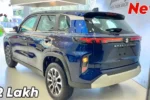The battle for supremacy in the electric van market has a new contender. Geely’s commercial vehicle arm, Farizon, is stepping up to the plate with its all-electric SV van, and it’s making waves right out of the gate. With a starting price of just £45,000, the Farizon SuperVan (SV) is positioned to challenge industry staples like the Ford E-Transit by combining innovative design, modern tech, and a fully electric powertrain.
Farizon SV: A Glimpse of the Future
Farizon, a brand backed by Chinese automotive giant Geely, isn’t new to the commercial vehicle game, but the SV marks a serious push into Western markets. This new electric van is part of Geely’s broader effort to electrify transportation, aligning with global moves toward zero-emission mobility solutions.
The SV stands for “SuperVan,” and it’s not just a name. The vehicle’s futuristic styling and tech-heavy features give it a concept-like presence, but it’s very much real and road-ready. Designed to be modular and adaptable for a range of use cases, it aims to serve both cargo and passenger configurations with equal efficiency.
Performance and Range That Compete
The Farizon SV offers a robust electric drivetrain with impressive specifications. Early data suggests a range of up to 273 miles (440 kilometers) on a single charge, depending on configuration. This outpaces many rivals in its class, including the Ford E-Transit, which maxes out around 196 miles.
Charging speed is another highlight. Thanks to its 800V architecture, the SV can reportedly charge from 20% to 80% in under 30 minutes. This makes it particularly appealing for businesses that can’t afford long downtimes between deliveries or services.
The electric motor promises smooth and quiet performance, while the lightweight chassis, aerodynamic design, and regenerative braking system all contribute to improved efficiency.
Designed for the Modern Fleet
The interior of the Farizon SV mirrors the smart, minimalist approach seen in many modern EVs. The driver-centric cockpit includes a large digital display and touch-sensitive controls. Connectivity features include over-the-air updates, integrated fleet management tools, and real-time diagnostics.
Importantly, the SV is designed to accommodate a variety of use cases. Whether it’s last-mile delivery, shuttle services, or urban logistics, the vehicle’s customizable rear architecture allows businesses to tailor it to specific needs.
Affordability with Innovation
One of the biggest talking points is the price. At £45,000, the Farizon SV undercuts many of its electric competitors, particularly when you consider its specifications. Government grants and tax incentives for electric commercial vehicles could further bring down the effective cost for businesses in the UK and EU markets.
The combination of affordability and advanced features makes the Farizon SV a disruptive entry, particularly for fleet operators looking to electrify without breaking the bank.
Ford Should Be Paying Attention
Ford’s Transit series has long dominated the van segment, particularly in Europe. The E-Transit, its electric variant, has seen strong uptake, but the emergence of capable alternatives like the Farizon SV may erode its market share.
Where the Transit relies on heritage and a vast support network, Farizon is betting on innovation, digital integration, and price competitiveness. If Geely manages to establish service and parts infrastructure in key Western markets, the SV could quickly become a favorite for both small businesses and large-scale operators.
A Disruptive Newcomer
Farizon’s entrance into the electric van market with the SV is not just a passing experiment. It’s part of a calculated global expansion that reflects China’s increasing influence in the EV space. The van isn’t just a product it’s a statement that legacy automakers can no longer rely solely on brand recognition and incremental innovation.
As the electric commercial vehicle race heats up, the Farizon SV could be the wake-up call the segment needs. With its sleek design, substantial range, quick charging, and competitive pricing, it’s sending a clear message: the electric van revolution is well underway, and no one is untouchable.




